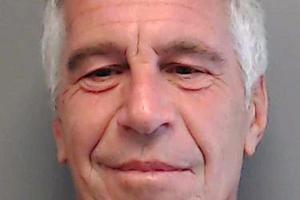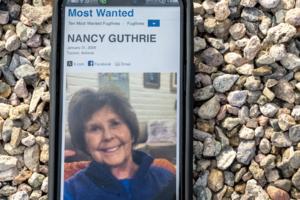Current News
/ArcaMax

Family of girl killed on Miami-based cruise says stepbrother has been charged, according to court document
MIAMI — A family member of a teenage girl found dead on a Carnival Cruise ship as it headed back to Miami in November said federal prosecutors have charged the teen’s stepbrother with her homicide, according to a recently filed court document.
Cleaning staff aboard the Carnival Horizon found 18-year-old Anna Kepner’s body underneath a bed...Read more

San Jose: Co-defendant pleads guilty in 2023 daycare toddler drownings
SAN JOSE, Calif. — A woman charged in the 2023 drowning deaths of two toddlers at the Almaden daycare she ran with her mother pleaded guilty Monday as trial hearings got underway, while her mother’s case continues toward a jury trial.
Nina Fathizadeh, 43, of San Jose, entered the plea and has a sentencing hearing set for May 8, according to...Read more

Colorado Senate passes measure that would allow people to sue ICE agents for constitutional violations
DENVER — The state Senate approved a measure Tuesday that would allow Coloradans to sue federal agents if they believed their constitutional rights were violated during immigration enforcement.
The Democrat-backed measure, Senate Bill 5, passed the chamber 20-11 on a party-line vote. It still needs to pass the House before it goes to Gov. ...Read more

Colorado congressional Democrats demand ICE abandon plans for immigration detention center in Weld County
DENVER — Three of Colorado’s congressional Democrats are calling on the U.S. Department of Homeland Security and Immigration and Customs Enforcement to abandon plans to open a new immigration detention facility in the small Weld County town of Hudson.
“As ICE agents continue to terrorize our communities, illegally detain U.S. citizens and...Read more

Gov. JB Pritzker renews call to ban cellphones in schools across Illinois after effort fell short last year
SPRINGFIELD, Ill. — Just one year after the Illinois General Assembly failed to pass a school cellphone ban, Gov. JB Pritzker is asking lawmakers to advance an even stricter version of the proposal that mandates all public and charter school districts adopt a ban that runs throughout the full school day.
The latest push was part of Pritzker�...Read more

5 dead after stabbing, police shooting on Key Peninsula in Washington's Pierce County
SEATTLE — Five people are dead, including a suspect, after a reported stabbing and a police shooting in Pierce County’s Key Peninsula, officials say.
A caller reported that a man was violating a no-contact order around 8:45 a.m. Tuesday, according to a statement shared by Key Peninsula Fire Department spokesperson Anne Nesbit.
Deputies ...Read more

'Spring break of the past is gone': Miami Beach leaders outline plan for March
MIAMI — Miami Beach leaders gathered Tuesday to send a unified message about the upcoming spring break season: yes, the city is relaxing some of its strictest rules and restrictions from recent years, but no, the party is not back on.
Speaking at Miami Beach Police Department headquarters in South Beach, Police Chief Wayne Jones said the city...Read more

FBI searches home, vehicle of armed North Carolina man killed by agents on Trump's estate
MIAMI — The FBI is trying to “establish a possible motive” behind a North Carolina man who traveled to Palm Beach County where he was fatally shot early Sunday on President Donald Trump’s Mar-a-Lago estate by U.S. Secret Service agents and a sheriff’s deputy, authorities said.
Agents concluded gathering evidence of the shooting scene ...Read more

Supreme Court bars suits against the Postal Service, even for intentional failure to deliver mail
WASHINGTON — The Supreme Court ruled Tuesday the U.S. Postal Service is shielded from being sued even if its employees intentionally fail to deliver the mail.
In a 5-4 decision, the court said Congress in 1946 had barred lawsuits "arising out of the loss, miscarriage, or negligent transmission of letters or postal matter," and that includes ...Read more

NYPD commissioner calls it 'criminal' to pelt NYPD cops with snowballs in Washington Square Park
NEW YORK — NYPD Commissioner Jessica Tisch has launched an investigation into a caught-on-camera clash where a rowdy crowd pelted a group of uniformed cops with snowballs in Manhattan’s Washington Square Park.
“The NYPD is aware of certain videos taken earlier today in Washington Square Park showing individuals attacking cops,” Tisch ...Read more

How to watch President Trump's State of the Union address tonight
WASHINGTON — President Donald Trump will deliver the first formal State of the Union address of his second term on Tuesday night at 9 p.m. EST.
Major networks will carry it live, including ABC, CBS, NBC, PBS and Fox News. Some, including C-SPAN, will have free livestreams available on YouTube as well.
Trump skipped a traditional State of the...Read more

Jeffrey Epstein accusers to attend Trump's State of the Union address
Democratic lawmakers plan to bring people who say they were victimized by sex offender Jeffrey Epstein to President Donald Trump’s State of the Union address on Tuesday.
Maryland Rep. Jamie Raskin announced in a statement Monday that he and Virginia Rep. Suhas Subramanyam will be joined by the brother and sister-in-law of late Epstein ...Read more

Bronx nurse whose son was grabbed by ICE is Schumer's SOTU guest
NEW YORK — A Bronx nurse whose high school student son was grabbed by Immigration and Customs Enforcement agents last year will be a guest of Sen. Chuck Schumer at President Donald Trump’s State of the Union address.
Raiza Contreras, 41, hopes her presence will spotlight what she calls the unjust treatment of her 21-year-old son, Dylan, ...Read more

Michigan Gov. Gretchen Whitmer to call for medical debt protections in final State of the State
LANSING, Mich. — Gov. Gretchen Whitmer is expected to advocate in her final State of the State address Wednesday night for protections against medical debt as the state braces for expected cuts to the Medicaid health insurance program for the poor.
During her final address to the Legislature as governor, the Democrat is expected to voice ...Read more

Kentucky would ban 'Glock switch' devices on semi-automatic handguns under House bill
LEXINGTON, Ky. — Kentucky would enact a state ban against a thumbnail-sized device that can convert semi-automatic handguns into automatics under a measure moving to the House floor.
The House Committee on Veterans, Military Affairs and Public Protection on Tuesday approved House Bill 299, which would make possession of the devices a Class C ...Read more
Queens assistant principal arrested on federal prostitution charges for pimping out porn star
NEW YORK — A Queens public school assistant principal has been arrested on federal charges over accusations he had a lucrative side hustle pimping out a California-based online porn star, officials said Tuesday.
Bond Ng, 47, was arrested on Sunday and charged with enticing a person to travel in interstate commerce to engage in prostitution, ...Read more
Kansas governor declared a World Cup emergency. GOP senators may let it expire
Kansas Gov. Laura Kelly and Republicans in the state Senate are at an impasse over the 2026 FIFA World Cup.
Earlier this month, the Democratic governor declared a state of emergency in three counties — Johnson, Wyandotte and Douglas — that will be most impacted by the sudden arrival of an estimated 650,000 visitors to the Kansas City region...Read more

Massachusetts power outages persist today: 250,000-plus without heat, Cape Cod in the dark
BOSTON — Cape Cod and the South Shore are still coping with the wrath of the Blizzard of ’26.
The 11 o’clock tally for power outages remains above a quarter of a million customers without power. The exact number is 251,541, according to the MEMA database update.
Up and down the Cape power remains out with Barnstable the worst in the ...Read more

California Gov. Gavin Newsom and Trump have vowed to crack down on corporate homebuying. A new bill aims to curb it
LOS ANGELES — In a rare moment of political alignment last month, Gov. Gavin Newsom and President Donald Trump vowed to crack down on corporate homebuying. Now, a new bill aims to make it a reality.
AB 1611, introduced by Assemblymember Matt Haney, D-San Francisco, in January, would eliminate a "tax loophole" that Haney says corporate ...Read more

Savannah Guthrie offers $1 million for information about mother, says she might be 'already gone'
Savannah Guthrie said Tuesday her family is offering a $1 million reward for information leading to her kidnapped mother, saying it’s possible Nancy Guthrie is “already gone.”
“But we need to know where she is. We need her to come home. For that reason we are offering a family reward of up to $1 million for any information that leads us...Read more
Popular Stories
- Violent aftermath of Mexico’s ‘El Mencho’ killing follows pattern of other high-profile cartel hits
- California mother with legal permission to live in US deported in under 24 hours
- Commentary: Stop the world, I want to step off
- Rubio credited Spain for the origins of the American cowboy. Mexico begs to differ
- Red and blue states alike want to limit AI in insurance. Trump wants to limit the states





